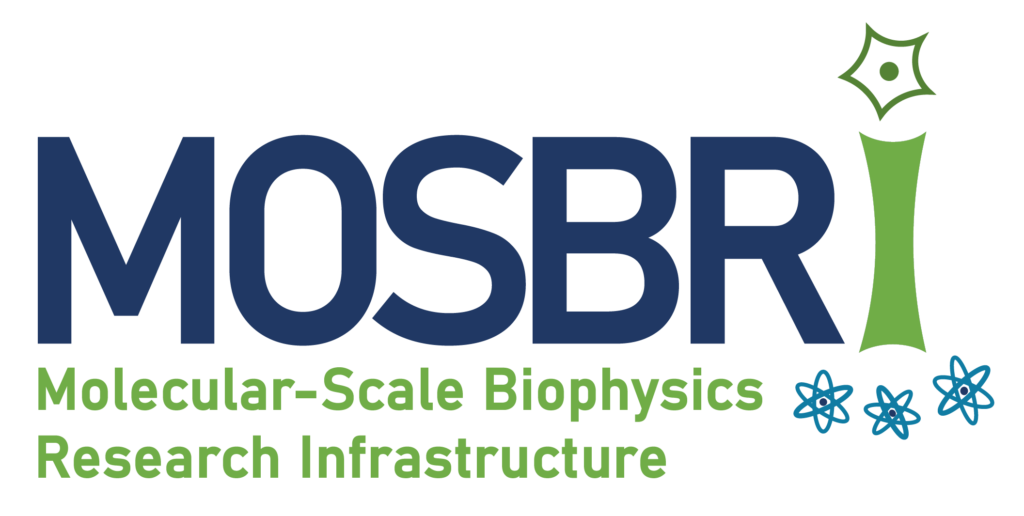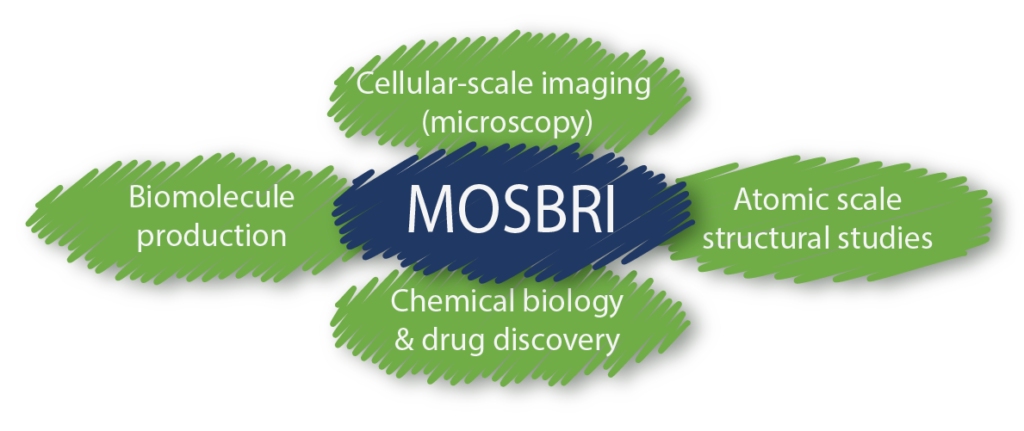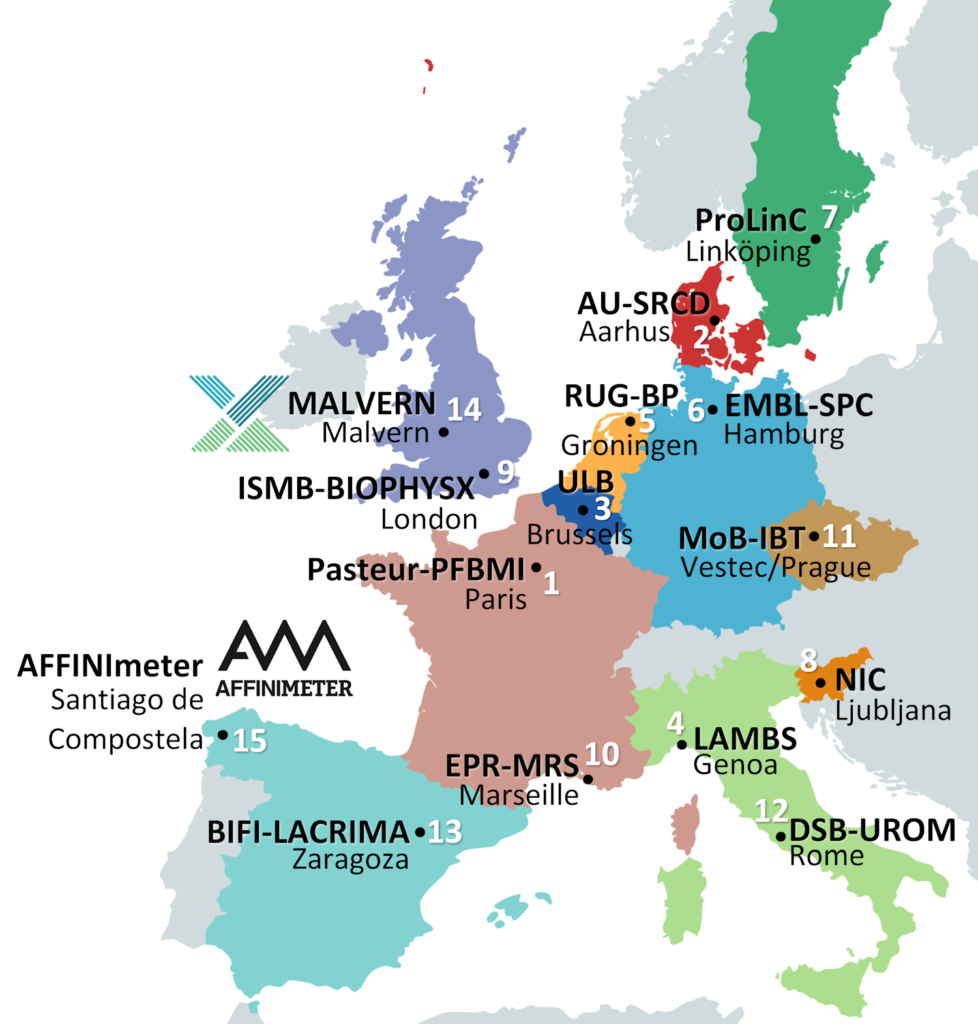
Molecular-scale biophysics aims at studying biological systems at an intermediate level between atomic-resolution structural descriptions and cellular-scale observations. It addresses essential questions on how active biomolecular assemblies form and function. These include insights into their architecture, folding, stability and dynamics, as well as into the energy and kinetics of their interactions, both at ensemble and single-event levels. It is a strongly interdisciplinary field involving physicists, biologists, chemists, as well as medical, bioinformatics and materials scientists.
Molecular-scale biophysics sits at the crossroads of several areas of expertise and thus holds a strategic position, critical to cellular, molecular and structural biology, as well as to biomedicine, bio-production and biotechnology. Molecular-scale biophysics approaches play a key role in describing the real-time dynamics of molecular structures and biological systems as well as their interactions with other biomolecules, macromolecular complexes and cellular components.

Recent years have witnessed a remarkable expansion of the versatility of molecular-scale biophysics technologies, including hydrodynamic approaches, spectroscopies, calorimetry, fast and ultra-fast real-time bio-sensing, native mass spectrometry, and single-molecule approaches such as atomic force microscopy and optical/magnetic tweezers. The potential of this impressive arsenal of methodologies to tackle challenges in biological, medical and One Health research is not fully exploited at present.
MOSBRI aims to address the pressing need for a truly integrated and multi-methodological taskforce, combining the best up-to-date instrumentation and the best expertise available in Europe, to the benefit of all researchers in the fields of biomedicine, biotechnology, biomaterials and beyond, from both academia and industry (notably SMEs).

This need was firmly established in the context of COST action MOBIEU (“Between Atom and Cell: Integrating Molecular Biophysics Approaches for Biology and Healthcare”, CA15126), started in 2016 and chaired by MOSBRI’s coordinator, Dr Patrick England. The MOBIEU network has successfully triggered the formation of a unique and truly pan-European biophysical community, by bringing together more than 150 resource laboratories, including research infrastructures and core facilities, coming from 30 different European countries. These laboratories, whether focused towards the understanding of biological systems or towards the development of novel methodologies and technologies, have an extensive and complementary expertise in biology, physics, chemistry, computing and biomedicine.
MOSBRI networks 2 industrial partners and 13 academic centres of excellence from 11 different countries, each having unique and complementary expertise, and all currently offering biophysics services within schemes based on institutional policies. MOSBRI provides access to a truly integrated panel of methodological tools and associated expertise, enabling breakthrough scientific discoveries concerning the molecular basis of biological processes and the development of novel therapeutic and prophylactic treatments. In addition, continuous improvement of laboratory practices and cross-fertilization between centres will be attained through exchange of staff, joint research activities and multi-laboratory benchmarking actions.
MOSBRI will contribute significantly to the qualitative and quantitative improvement of scientific research in molecular-scale biophysics and connected fields, with positive impacts on the health, well-being and environment of all European citizens. This will be achieved by focusing on the following five specific objectives covering Trans-National Access, Networking activities and Joint Research Activities:
- Objective 1: To provide a “one-stop-shop” access to a wide range of world-class instruments and expertise in molecular-scale biophysics for the European academic and industrial scientific communities
- Through an efficient, coordinated Trans-National Access scheme that will enable a wide diversity of users to access top-level instrumentation and far reaching expertise in a wide range of bio-molecular and biomedical topics and systems, thus accelerating discovery and innovation.
- Objective 2: To build a wide and interactive community of users and molecular-scale biophysics scientists and to create awareness of the full potential of integrative molecular-scale biophysical approaches among the scientific community at large
- Through a variety of Networking activities, including scientific meetings, training schools for junior researchers and new users, advanced courses, benchmarking actions, intra-consortium staff exchange and fruitful synergies with closely related organisations.
- Objective 3: To establish and disseminate high quality standards and best practices in multi-technological data generation, analysis and archiving
- Through the continuous development and expansion of MOSBRI’s technological and scientific expertise, by establishing training standards, best practice guidelines, and standard protocols for instrument calibration, and by disseminating them through inclusive networking actions and advocacy actions targeting both scientific and societal stakeholders.
- Objective 4: To generate and disseminate cutting-edge knowledge allowing to improve the quality and quantity of MOSBRI’s services
- By fostering Joint Research Activities at the highest level of excellence aimed at enhancing the range of biological and technical problems that can be solved and improving data quality. By disseminating their outcomes through pro-active outreach operations, in congresses and other scientific events all across Europe.
- Objective 5: To engage in synergies with a wide variety of European industrial and academic stakeholders
- By establishing win-win cooperative actions with instrumentation, pharmaceutical and biotechnological companies as well as with Contract Research Organizations, research infrastructures, learned societies, and European higher education institutions.
